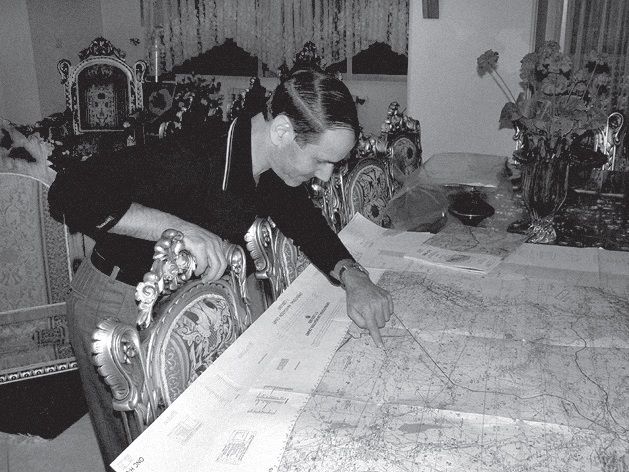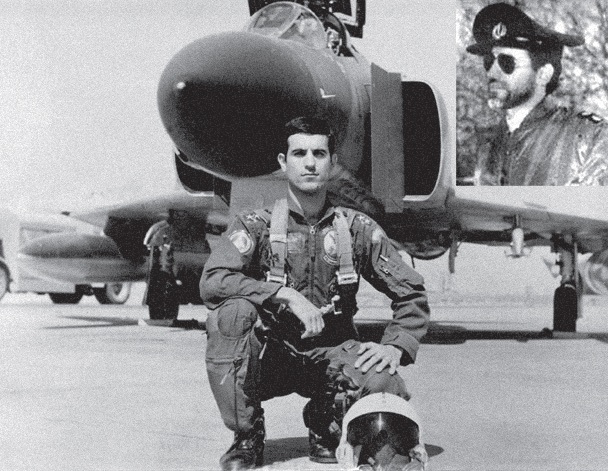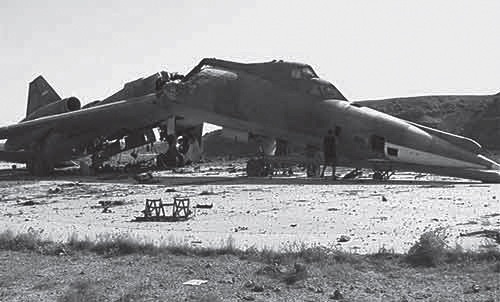Air Raid to Al-Waleed (29)
The Story of Demolishing Fighters and the Equipment in Al-Waleed Triple Military Bases Known as H-3
2016-7-24
Air Raid to Al-Waleed (H-3)
The Story of Demolishing Fighters and the Equipment in Al-Waleed Triple Military Bases Known as H-3
By: Brigadier General Ahmad Mehrnia
Tehran, Sooreh Mehr Publications Company
2010 (Persian Version)
Translated by: Zahra Hosseinian
Retired Colonel Asghar Bagheri, rear cockpit pilot of flight Number 6, quotes his memoirs as follow:

Colonel Asghar Bagheri is showing the location of H-3 base on the map (2008).
It was supposed to bomb with Skip technique. Probably we were several feet lower than the calculated height, so a few shrapnel hit our aircraft. Maybe this situation was caused by enemy anti-aircraft bullets. Anyway, we lost part of engine power, hydraulic power, and our utility system. While the rest were refueling for the third time and leaving the region, we hardly approached to tankers, but the conditions didn’t allow us to refuel. We informed Colonel Izadseta about our problem. First he ordered us to go to Damascus airport, but when we informed him about the critical situation, he recommended us to head toward an airport nearby in the company of a tanker, so that the things is organized easier. We continued towards the West, but the situation was very bad and controlling the aircraft became harder and harder each moments. The fuel also quickly decreased. We were nearly ready to leave the aircraft, although Khazraei did his best to keep flying until the last possible moment. Leaving the aircraft with ejection seats was not easy, but we had no choice but to think about it. With short conversations, we filled Izadseta in on the last situation now and then; and we were assured the other crews hear our voice and are extremely worried about us.
On the way, Izadseta drew our attention to an airport with relatively short runway. Given the gravity of the situation, we decided to have an emergency landing there. Taking the necessary measures, we immediately were ready to land; Khazraei put the handle of controlling land gears in the open state. Another unlucky one! Hydraulic oil tubes had been damaged and because of lack of adequate hydraulic pressure, the red light of forward landing gears, which indicated wheels haven’t opened completely, still flashing and made us more nervous. We must land, but we had nor time, nor could coordinate for preparing the runway for an emergency landing. The runway lacked cables of rapid decelerating speed or cable barrier. Fortunately, the lights of two main land gears became green indicating the right opening of them. Khazraei, who was a devout person, said: “Asghar! We trust in God because everything is in His hand.” We whispered prayers, as we got closer to the runway. When the land gears touched the runway, Khazraei used airbrake (in this case, the nose cone is controlled to be up until the last possible moment to decelerate the speed slowly and it itself fall down), according to the instructions, and at the same time he pressed the brake pedal with high intensity to stop the aircraft more quickly because of the shortness of runway. For this reason the tier of main land gears burst and the aircraft was moving on the rim. By deceleration of speed and falling of nose cone, Mahmoud lost the control and the aircraft continued the path towards out of runway. At the last moments, hugely dangerous conditions occurred. At any minute it was possible that the aircraft overturned or was fired or suffered severe damages, which in this case it was more likely we are killed. The God, however, blessed us and struts or the thick metal columns to which the wheels are attached, and now nor a wheel and even nor a rim had remained on them, stuck in sandy ground by the runway and the aircraft was riveted to the spot.

Shahid Major General Mahmoud Khazraei when he was first Lieutenant and Lieutenant Colonel
The base had several hangars and it seemed to me more a defensive base than a fighter one. After few moments, Syrian security forces rushed towards and surrounded us. They spoke in Arabic which was not much understandable for us, so we had remained silent. The type of aircraft and the symbol of flag on it showed that what our nationality is. They first had thought that might be attacked by Israel or Iraq, but saw an Iranian aircraft in their base, to their astonishment. They immediately took our pistols and along with themselves took us to administrative headquarters building. The airport was without any facilities and its local name was “Sukho-7”, as I heard from agents. Today, I don’t see such a name when I look at the map and guess that we landed in “Palmira” airport. With a very old phone they soon called officials in Damascus. Several times I heard the commander say ‘Damascus, Damascus’. They pronounced it in such way that I thought they say Moscow! I thought that their mean is to hand us over to Moscow; because at that time the Syria was in the pivot of East… I mean Soviet Union. Apparently, they were ordered to send us to the capital. Therefore, we were transferred to Damascus by helicopter one or two hours after lunch. Fortunately, due to very good Iran-Syria relationships, Izadseta and other political authorities had done coordination and necessary things within two or three hours it took to reach Damascus. So, without any trouble we quickly boarded the tanker and came back to Iran. At the end, I must acknowledge that: first, our survival from that critical situation was not possible except with favors of Allah Almighty. Secondly, it was a big thing the operation remained secret until the last minutes; because at that time some ones, as a fifth column, reported our operational information to the enemy and in this case, if the enemy was aware of the mission, a major disaster could occur. Saddam was so villainous person that attacked us and our fuel tankers in third country's territory. At that time, Col. Hooshang Attarian was the commander of West base and always came and went to it. He was respected and was filled in on all issues of base. It was later cleared that he has joined to the Tudeh Party of Iran and collaborated with the enemy. We heard that he reported very sensitive information to the enemy and has caused a lot of irreparable damages. Fortunately, in this particular case, this mission even had been seemingly concealed from him. Also, I should appreciate the bazaar merchants who encouraged us and presented a 2/5 meter carpet to me (which I still kept it as a souvenir).

One of strategic destroyed Iraqi Tupolev Tu-22 which was used for heavy bombing mission.
According to the received information, the importance of southern base was not much than the two other bases. That's why the group of two aircrafts had been planned for destroying the equipment which was available in it. With a combination of various ammunitions, the second group also appears above their target and bombs it within a minimal time interval. At this time the defense had not still activated; but retired Second Brigadier General Nasser Kazemi said:
“I saw a number of peoples are moving aircrafts and equipment, when we reached above the base. It seemed that they had been informed of my colleagues’ attack a few minutes ago. I was surprised that they even used tractor for displacement. The people who were responsible of defending were running towards cannons. Simultaneously, we attacked our target very well and safety left there. I saw Khazraei’s aircraft as we closed the border and for consoling I approached him and guided him to place under the tanker.”
To be continued…
Number of Visits: 4187








The latest
Most visited
A section of the memories of a freed Iranian prisoner; Mohsen Bakhshi
Programs of New Year HolidaysWithout blooming, without flowers, without greenery and without a table for Haft-sin , another spring has been arrived. Spring came to the camp without bringing freshness and the first days of New Year began in this camp. We were unaware of the plans that old friends had in this camp when Eid (New Year) came.
Attack on Halabcheh narrated
With wet saliva, we are having the lunch which that loving Isfahani man gave us from the back of his van when he said goodbye in the city entrance. Adaspolo [lentils with rice] with yoghurt! We were just started having it when the plane dives, we go down and shelter behind the runnel, and a few moments later, when the plane raises up, we also raise our heads, and while eating, we see the high sides ...The Arab People Committee
Another event that happened in Khuzestan Province and I followed up was the Arab People Committee. One day, we were informed that the Arabs had set up a committee special for themselves. At that time, I had less information about the Arab People , but knew well that dividing the people into Arab and non-Arab was a harmful measure.Kak-e Khak
The book “Kak-e Khak” is the narration of Mohammad Reza Ahmadi (Haj Habib), a commander in Kurdistan fronts. It has been published by Sarv-e Sorkh Publications in 500 copies in spring of 1400 (2022) and in 574 pages. Fatemeh Ghanbari has edited the book and the interview was conducted with the cooperation of Hossein Zahmatkesh.

